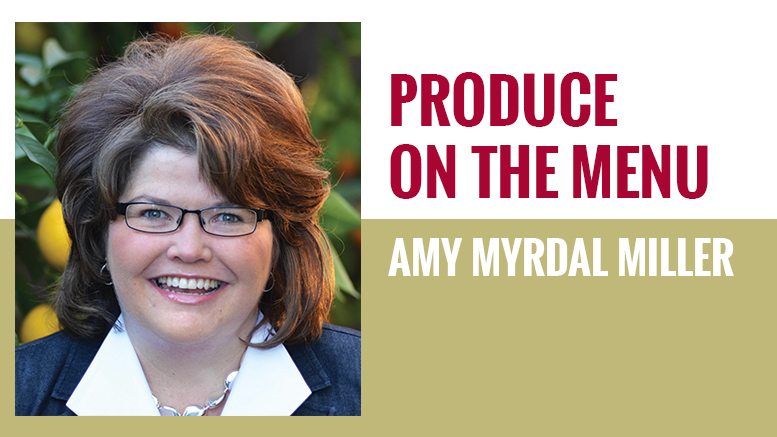Foodservice Sales Strategy
August 1, 2018 | 3 min to read
The article emphasizes the significance of integrating foodservice into produce sales strategies, highlighting its immense potential as U.S. restaurant sales near $800 billion in 2018. With 70 percent of adult consumers seeking more fruits and vegetables, the Produce for Better Health Foundation (PBH) aims to enhance menu options through partnerships with menu R&D leaders. PBH’s collaboration with these professionals focuses on developing a robust foodservice strategy, underscoring the industry's growing influence on consumer wellness choices.

Originally printed in the August 2018 issue of Produce Business.
 If you sell produce, foodservice should be part of your sales strategy. Why? Foodservice is a big business in the United States. And it’s a big business opportunity for produce.
If you sell produce, foodservice should be part of your sales strategy. Why? Foodservice is a big business in the United States. And it’s a big business opportunity for produce.
According to the National Restaurant Association, restaurant sales in the United States will reach nearly $800 billion in 2018 from purchases at more than one million restaurant locations, of which 70 percent are single-unit operations. There are 14.7 million Americans — 10 percent of the U.S. workforce — working in restaurants. Between now and 2027, the restaurant industry will create 1.6 million new restaurant jobs.
Increasingly, the American public is outsourcing more and more of its food production to restaurants. Half of the U.S. food dollar is spent on food prepared away from home. This does not include prepared foods purchased at retail, which represents another growing category of outsourcing food preparation.
Research from Datassential, a leading foodservice research firm, shows 51 percent of consumers in a nationally representative sample report experiencing new trends in a restaurant compared with just 24 percent in a grocery store and a paltry 8 percent from media sources.
The Produce for Better Health Foundation (PBH) is developing a foodservice engagement strategy as part of its brand refresh efforts. Wendy Reinhardt Kapsak, president and chief executive, says, “We know foodservice drives many trends. We want to help influence the food and flavor trends that begin in foodservice, to ensure fruits and vegetables in all forms — fresh, frozen, canned, dried and 100 percent juice — are represented on menus in lasting ways that capture the attention and spending power of the American consumer.”
Increasingly, the American public is outsourcing more and more of its food production to restaurants. Half of the U.S. food dollar is spent on food prepared away from home. This does not include prepared foods purchased at retail, which represents another growing category of outsourcing food preparation.
“We also know wellness is a lifestyle today,” says Kapsak. “The majority of consumers are striving for health through their lifestyle choices.” Research from Datassential shows more than 70 percent of adults actively are trying to increase their intakes of fruits and vegetables. They believe in the power of produce to affect their health in a positive way, and they are looking to restaurants to provide new, interesting and appealing options for increasing their intake of produce.
 So how does an organization such as PBH go about developing a foodservice strategy? PBH is starting by developing relationships with the men and women who lead menu research and development (R&D) efforts at leading volume foodservice companies, including chain restaurants and contract foodservice organizations. PBH included a panel of these leaders at its 2018 Consumer Connection conference in April, where the menu R&D professionals talked at length about how consumer interest in “plant-forward” menu concepts is driving increased use of fruits and vegetables on American menus.
So how does an organization such as PBH go about developing a foodservice strategy? PBH is starting by developing relationships with the men and women who lead menu research and development (R&D) efforts at leading volume foodservice companies, including chain restaurants and contract foodservice organizations. PBH included a panel of these leaders at its 2018 Consumer Connection conference in April, where the menu R&D professionals talked at length about how consumer interest in “plant-forward” menu concepts is driving increased use of fruits and vegetables on American menus.
Research from Datassential shows PBH is continuing to develop relationships with menu R&D professionals through events such as the PMA Foodservice Conference. At the event last month, PBH hosted four menu R&D leaders for the three-day conference in Monterey, CA. Says Kapsak, “We carefully selected leaders for this special opportunity who support PBH’s mission; whose menu R&D work shows they focus on fruits and vegetables in impactful, compelling ways; and who we know will continue to engage with PBH to help us develop a relevant, robust foodservice strategy for the next three to five years.”
What’s next in PBH’s plan to develop their foodservice strategy? “We need support from the industry,” says Kapsak. “We know our supporters understand and appreciate the power of retail when it comes to selling produce. We need more of our supporters to appreciate the influential impact foodservice has on our food system. We look forward to working with the companies who already have a robust foodservice sales strategy while supporting the companies who are striving to develop their strategy.”
Amy Myrdal Miller, MS, RDN, FAND is a farmer’s daughter from North Dakota, award-winning dietitian, culinary nutrition expert, and founder and president of Farmer’s Daughter Consulting, Inc. She is the director of The Culinary Institute of America Healthy Menus R&D Collaborative and a consultant for the Produce for Better Health Foundation. You can learn more about her business at www.farmersdaughterconsulting.com, and you can follow her insights on food and flavor on Twitter @FarmFlavorFun
2 of 23 article in Produce Business August 2018

